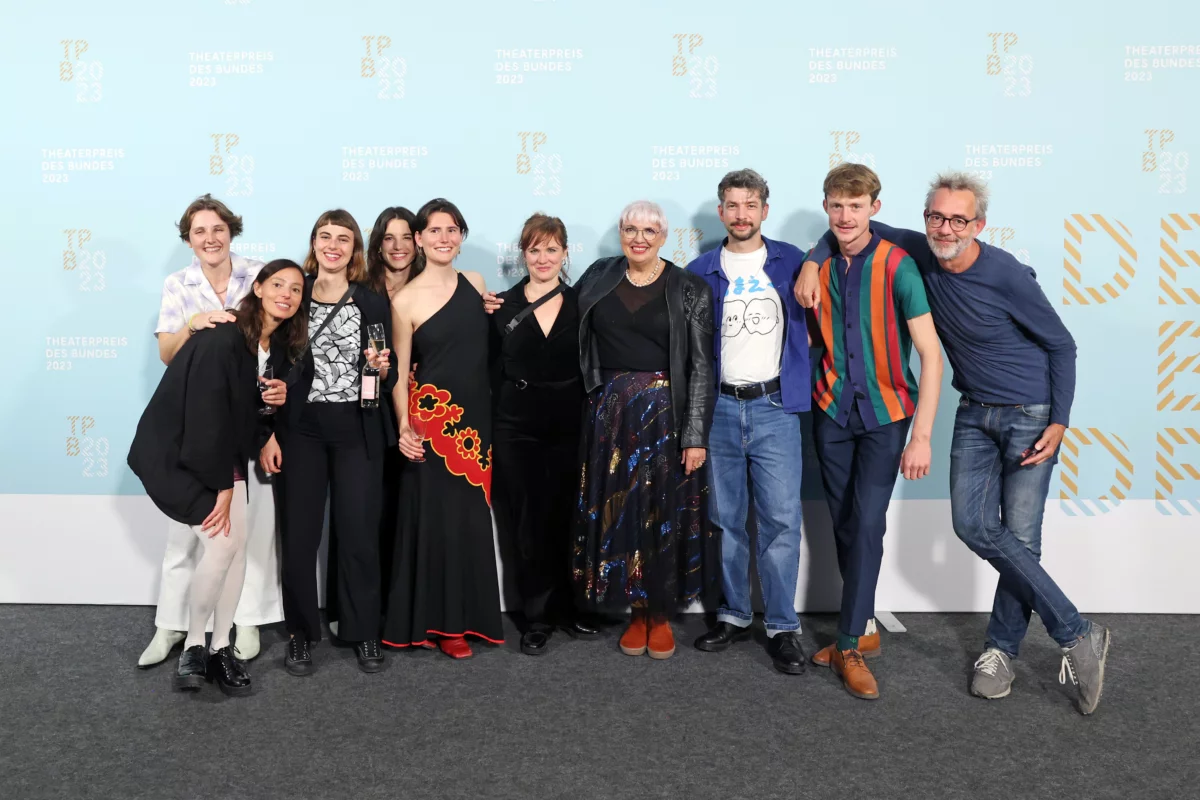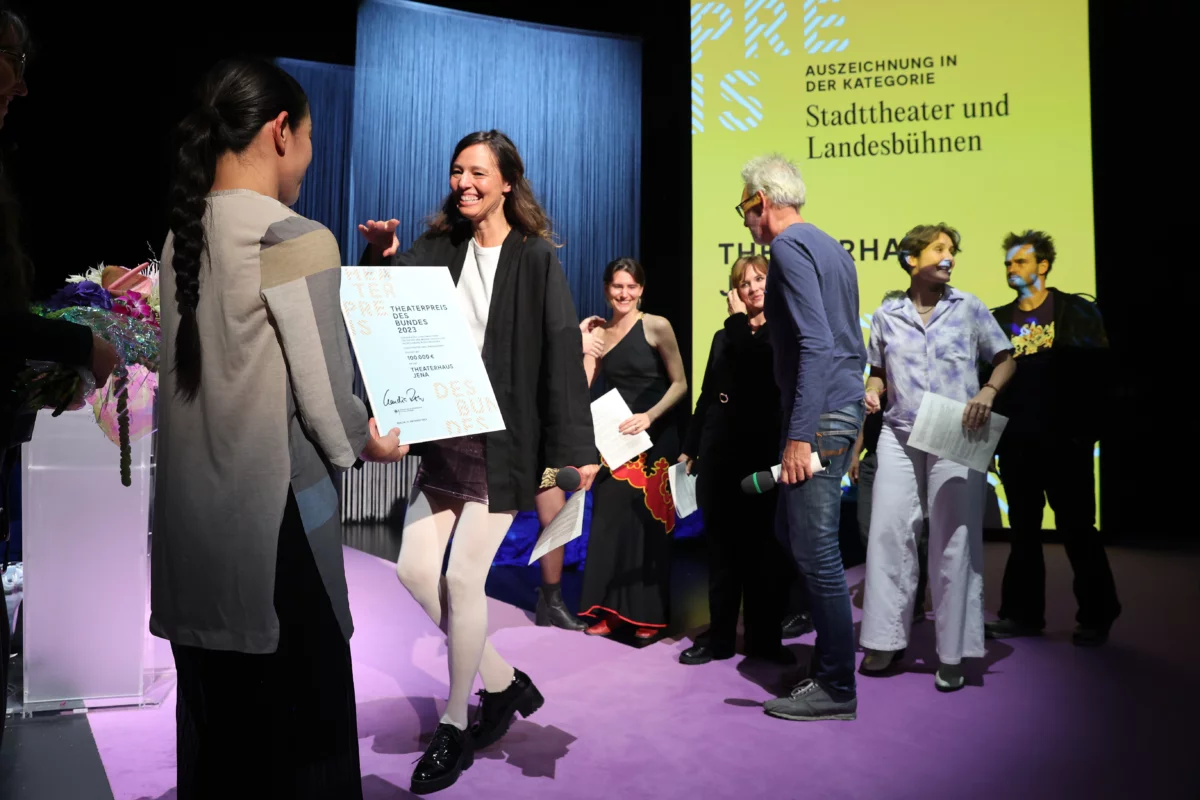Thuringia? No problem!
By Christine Wahl
The creative director and director Lizzy Timmers, the actress Pina Bergemann and the dramaturge Hannah Baumann from the Theaterhaus Jena in conversation with Christine Wahl about the award of the Theaterpreis des Bundes in the category of municipal and state theaters.
Ms. Timmers, Ms. Bergemann, Ms. Baumann – congratulations on your Theaterpreis des Bundes award in the category of municipal and state theaters! Usually, conversations like this are held with the theater's artistic director. In your case, however, that is not possible: the position simply does not exist. Why do you explicitly reject the classic artistic director model?
Lizzy Timmers: I think you miss out on a lot of great ideas when you're in a position where you make top-down decisions. Even if you have the opportunity to be on different boards, you probably have much less practice in really listening to others.
As a municipal theater, the Theaterhaus Jena practices a model that is unique in Germany: It’s a gGmbH (limited liability company) that is owned by those currently or formerly working in the theater. The decision on the artistic direction is up to the shareholders, and to date the theater has always been run by teams.
Timmers: I really enjoy this teamwork! In work meetings, for example, I always go in with idea A and come out with ideas B, C, D and E – that's absolutely fantastic. I also see that our actors move through the theater with much more self-confidence, because they see themselves as active participants and feel a corresponding sense of responsibility for the place.
Pina Bergemann: Compared to other municipal theaters where I have worked before, the Theaterhaus Jena offers greater artistic freedom – quite apart from the fact that the classic artistic directorship model naturally also enables the abuse of power, because a great deal of power is concentrated in a single person. Assuming that this imaginary classical artistic director, which we assume in this model, then also directs himself and casts me as an actress in his own production, with which I do not agree at all artistically, I am in a serious dilemma: Should I really say so? I could potentially endanger my job.
Hannah Baumann: I can confirm that in contrast things are pretty fearless at the Theaterhaus Jena, and I also notice that it makes me much more open in the artistic processes. From working at other theaters, I know this feeling of pressure to get one's own points across and not give up your own agenda. At the Theaterhaus Jena, on the other hand, I have often learned from ways of thinking or artistic approaches that I had initially ruled out for myself and which I suspect I would not have been open to today under different working conditions.
 © Dorothea Tuch
© Dorothea Tuch
The team of Theaterhaus Jena with Minister of State for Culture Claudia Roth
This emancipatory moment, which you all describe from different perspectives, is in the DNA of this theater: The Theaterhaus Jena in its current form emerged from the civic engagement of the immediate post-reunification period. In 1991 – after Jena had not had a professional theater ensemble for over 40 years – it was newly founded by the acting graduates of the Berlin "Ernst Busch" School and initially financed on a job-creation basis until, with the support of prominent theater people such as Heiner Müller and Frank Castorf, it was possible to transform the previously municipal theater into a limited liability company whose shareholders were primarily ensemble members. Artistically, the theater is associated with great names: Actress Sandra Hüller, director Claudia Bauer, musician, cabaret artist and former puppeteer Rainald Grebe have all worked here. What role does this history play for you today?
Bergemann: You really take on a great legacy when you start here; the names Bauer, Grebe and Hüller really just fly around your ears in the first few days. You sit down on the nearest chair, completely flabbergasted, and think: Okay – and what are we actually doing here now? (Laughs) In this situation, it helps enormously to know that the staff has made a conscious and concrete decision in your favor. Because the fact that you don't stand in awe, but at some point also say: Well, you've always done this or that this way, but now we're doing it differently, is absolutely intentional and important for everyone involved.
Baumann: I think you can still feel a bit of that anarchic spirit in the theater, it's chaotic in a good way. For example, when tasks are assigned – who organizes or gets or sets up something specific – suddenly everyone ends up doing it. That's what I like: That people are really creating their space together.
What does the structure of the Theaterhaus make possible in specific artistic terms that doesn't work in other models?
Bergemann: For me, one of the greatest gifts is that we don't have subscribers. That makes us more agile: We don't have to plan our projects with such long lead times as other theaters and can react more spontaneously to current issues. And the audience still comes!
 © Dorothea Tuch
© Dorothea Tuch
The Theaterhaus Jena accepts the award.
Which surely also has something to do with your claim to respond directly to local issues and circumstances. Jena is located in Thuringia – a federal state that is associated in the public perception above all with the far-right terror group, the NSU, with Björn Höcke and a high approval rate for the AfD. How do you experience Jena – and Thuringia – from an internal perspective?
Timmers: When I came to Theaterhaus Jena five years ago with the Wunderbaum collective from the Netherlands, our first motto for the season was: “Thuringia – no problem”. And for me, this slogan basically feeds into our work to this day – which means, above all, that we are always intensively dealing with the question of how to stay in conversation with each other in a society where such extreme political views exist. We conducted many interviews for our theater projects, also in the surrounding villages, and found it hugely interesting what practices people there have developed to maintain contact with each other, even when political opinions diverge so much. For myself, I think it's important to work across bubbles and – although you should of course make your own position and boundaries clear – not to dismiss people out of hand, but to invite them in. As a hippie at heart, I've always been sustained by the hope that with art – with theater – you can open people up to other perspectives.
Bergemann: However, it must also be clearly stated that Jena is a bubble. Many people – and I don't exclude myself at all – are completely surprised when they come here for the first time: This young and left-wing scene here, the many students, these beautiful old buildings with horrendous rents – that's Jena? Most people only know the city from the highway, where you drive past the high-rise buildings. And, of course, Jena is associated with the NSU.
Baumann: I have the feeling that are still not enough queer, diverse places in Jena. I think it's important for the Theaterhaus to open up a new space there.
In principle, you obviously succeed well in getting the most diverse scenes, milieus and generations interested in your performances. One can also meet people here who have not always been enthusiastic about theater.
Bergemann: For example, we brought the Wartburg to the theater: a well-known old East German pub that had survived the fall of the Berlin Wall and lasted a long time, but at some point had to close because its landlord Rolf – "Rolfe" – retired. We faithfully recreated this pub, which was really a place that many people in Jena identified with, on stage, and countless people came to simply sit, eat and drink in the Wartburg once again. This was indeed a very special audience: many of them spontaneously told their own life stories within the context of the play.
The structure of the Theaterhaus Jena also includes a strict measure to prevent artistic torpor: Every five to seven years, the shareholders' meeting appoints a new leadership team. You have just started your last season, and in the summer your era at the Theaterhaus Jena will definitely be over. How do you feel about this situation?
Timmers: I am totally ambivalent about it! On the one hand, I think that these regular changes in leadership are absolutely good and right, so that the audience gets the chance to constantly encounter new aesthetics, because there is no artistic opposition in Jena in the form of another theater. Personally, of course, I have the feeling that we're just getting started here, especially since the pandemic has robbed us of much of the time we were supposed to have. But in the end, I say to myself: You are 42 now and still have the necessary flexibility, so come to terms with the fact that things are ending here, and just get moving; it's good for you!
Bergemann: For me, there are also two sides to the issue – although one must not forget that this need for renewal also has to do with money, of course. So, it's not just about creating space for innovation here every seven years, but also about the fact that the theater simply can't afford to pay more experienced people and therefore keeps bringing in beginners – which in turn undoubtedly also has a quality, no question.
Money is a good keyword: The Theaterpreis des Bundes award is not only a symbolic recognition but also an economic one. Have you already planned what to do with the prize money?
Bergemann: We are thinking about biding farewell to the Theaterhaus Jena with a series of programs entitled "Collective Madness": a night of collectives that will once again examine the topic in a larger social context and perhaps also make the theater landscape more aware of our model. For such artistic projects, the 100,000 euros is of course fantastic; they would not be affordable with our normal budget.